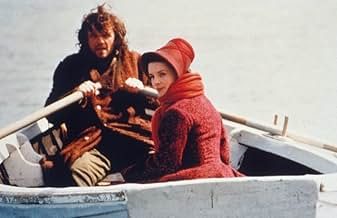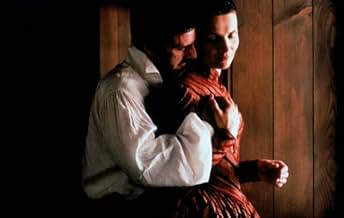IMDb-BEWERTUNG
7,1/10
5815
IHRE BEWERTUNG
In einer kleinen französischen Kolonie tötet ein betrunkener Mann jemanden. Während eine Guillotine verschifft wird, verändert er sich und wird ein guter und beliebter Mann.In einer kleinen französischen Kolonie tötet ein betrunkener Mann jemanden. Während eine Guillotine verschifft wird, verändert er sich und wird ein guter und beliebter Mann.In einer kleinen französischen Kolonie tötet ein betrunkener Mann jemanden. Während eine Guillotine verschifft wird, verändert er sich und wird ein guter und beliebter Mann.
- Regie
- Drehbuch
- Hauptbesetzung
- Auszeichnungen
- 3 Gewinne & 9 Nominierungen insgesamt
Empfohlene Bewertungen
You have to watch the odd foreign film such as this to understand just how far Hollywood has strayed from cinematic honesty. This is a simple, beautifully done, superbly acted piece of theatre set in one of the world's least known places, the fog shrouded French island of St. Pierre, off Newfoundland. It's a simple yet gripping film with an intriguing plot, almost a morality play. There is visceral human drama, much mystery and wonderful soul stirring pathos. And how nice to see a movie without the mandatory Hollywood happy ending. A well spent evening!
The ancient Greeks, gifted with an abstract way of thinking that was always trying to come down to earth and clothe itself with the commonplace occurrences of everyday life, did not have one all-embracing term for love, a we do, but broke it down into four types: affection (storge), friendship (phileo), sex (eros) and charity (agapao). And probably not since the ancient Greeks has a love story come along which not only divides love into its four types, but also weaves them, with enormous skill, into a single story. The Widow of Saint-Pierre is a love story of the tragic Greek proportions. It's an enormously beautiful movie, a story that gains power with every viewing. And for that reason, it's one of the most remarkable videos I've seen in a very long time.
We've all seen a plethora of films from Hollywood, which basically confine love, and the act of love, to eros. We all know the well-worn script. But what would it look like to view a film in which a relationship expresses all four types of love, and throbbing full force? I would be giving too much away if I were to tell you how these four types of love are rolled up so tightly into a single relationship, but that's exactly what we seen in the liaison between Jean, the Captain (Auteuil) and his wife, Pauline (Binoche). It's intensely interesting, because the performances are pitch-perfect. Even the cowardly bureaucrats, who feel threatened by the captain and his wife, are a picture of cowardly perfection. Their motives are all too human, all too real. But so is the unfathomable love they don't understand, and fear.
One of the things I really appreciate about this film is the way it expresses all forms of love as having boundaries. Jean and Pauline are not clinging vines. What we see is a mature, healthy relationship, each partner respecting the unique characteristics of the other. What a contrast to the infantile clinging vine romances out of Hollywood!
We've all seen a plethora of films from Hollywood, which basically confine love, and the act of love, to eros. We all know the well-worn script. But what would it look like to view a film in which a relationship expresses all four types of love, and throbbing full force? I would be giving too much away if I were to tell you how these four types of love are rolled up so tightly into a single relationship, but that's exactly what we seen in the liaison between Jean, the Captain (Auteuil) and his wife, Pauline (Binoche). It's intensely interesting, because the performances are pitch-perfect. Even the cowardly bureaucrats, who feel threatened by the captain and his wife, are a picture of cowardly perfection. Their motives are all too human, all too real. But so is the unfathomable love they don't understand, and fear.
One of the things I really appreciate about this film is the way it expresses all forms of love as having boundaries. Jean and Pauline are not clinging vines. What we see is a mature, healthy relationship, each partner respecting the unique characteristics of the other. What a contrast to the infantile clinging vine romances out of Hollywood!
8=G=
As the best of French cinema does so adroitly, "The Window of Saint-Pierre" tells most of it's story laconically with knowing looks and subtle behaviors while the story it tells is a relentlessly plodding drama of unspoken words and the emotions they evoke. "Widow..." is more about integrity, honor, love, and other intangibles than it is about its relatively simple storyline and the characters involved. A beautifully crafted somber film, "Widow..." is recommended for mature audiences because a measure of maturation is required to appreciate all this austere film has to offer.
I was most impressed with the visual language of this movie that does not waste words to show emotions. The tensions are well reflected in the play of the actors, whose gestures, shrugs and smiles say more than a thousand lines.
Another interesting feature of the movie is that it does not follow the easy path of romance that is "expected" by the public. In turn, it exposes a world which is cruel, unfair, where justice is determined by personal interests and where those who fight the system are seen as mad and excluded from the "high society".
It is a movie about the determination to fight for something one believes in!
Another interesting feature of the movie is that it does not follow the easy path of romance that is "expected" by the public. In turn, it exposes a world which is cruel, unfair, where justice is determined by personal interests and where those who fight the system are seen as mad and excluded from the "high society".
It is a movie about the determination to fight for something one believes in!
Juliette Binoche plays the wife of a military officer in a remote island town in 1849 Newfoundland who becomes devoted to the cause of saving the life of a condemned murderer. I was torn between admiring `The Widow of Saint-Pierre' for not taking the obvious route of having the captain's wife fall in love with her protege and run off with him (e.g., `Mrs. Soffel"), and a feeling of letdown that it was avoiding opportunities for more vivid and realistic drama. That there is an attraction between the two is made clear, especially in the highly charged, yet muted eroticism of the reading lesson scene. This film was based on a true story, but I couldn't help wondering if the actual killer was as saintly and devoid of guile as he seems in this movie. Among other things, he resists his attraction to his benefactress, although she would probably be more than willing to sleep with him, saves the life of a village woman whose house has slipped its moorings, and passes up an excellent chance to escape because he doesn't want to get anybody in trouble. He impregnates another woman, although it appears to be true love, and he then does the decent thing and marries her. One could accept that a criminal could be redeemed, but here he's a little too good to be true, reinforcing my suspicion that the characterization was meant more to reinforce the filmakers' anti-capital punishment stance than as a reflection of his actual personality. Daniel Auteil as her husband is stuck playing a character whose emotions remain largely inscrutable. The film would have us believe that there is no jealousy or resentment in the husband as his wife dedicates her life to rehabilitating and saving the condemned man under his charge. Ultimately, the captain gives up his own life for both of them, but I kept waiting for a significant sign that he had some inner conflict about doing so. After all, he is a career military officer sworn to uphold the law as it is. Who knew that underneath he was a bleeding heart liberal! This film is interesting and absorbing up to a point, but ultimately, it's also bland and overly complacent dramatically.
Wusstest du schon
- WissenswertesThe film was to be completely filmed on the island of Saint-Pierre, but when the snow failed to arrive, the production had to move further north to Newfoundland for certain sequences.
- PatzerWhen Neel is told he's strong enough to "ramer jusqu'au chez les Anglais", the English subtitles say "row over to Canada" rather than "row over to the English". This introduces an error: both the geography and the dialogue in other scenes make it clear that Newfoundland is meant, but Newfoundland wasn't part of Canada until 1949.
- VerbindungenFeatured in The 58th Annual Golden Globe Awards 2001 (2001)
Top-Auswahl
Melde dich zum Bewerten an und greife auf die Watchlist für personalisierte Empfehlungen zu.
- How long is Widow of St. Pierre?Powered by Alexa
Details
- Erscheinungsdatum
- Herkunftsländer
- Offizieller Standort
- Sprache
- Auch bekannt als
- Widow of St. Pierre
- Drehorte
- Fortress of Louisbourg, Louisbourg, Nova Scotia, Kanada(as Saint-Pierre)
- Produktionsfirmen
- Weitere beteiligte Unternehmen bei IMDbPro anzeigen
Box Office
- Budget
- 100.000.000 FRF (geschätzt)
- Bruttoertrag in den USA und Kanada
- 3.193.889 $
- Eröffnungswochenende in den USA und in Kanada
- 31.702 $
- 4. März 2001
- Weltweiter Bruttoertrag
- 7.193.889 $
- Laufzeit1 Stunde 52 Minuten
- Farbe
- Sound-Mix
- Seitenverhältnis
- 2.35 : 1
Zu dieser Seite beitragen
Bearbeitung vorschlagen oder fehlenden Inhalt hinzufügen

Oberste Lücke
By what name was Die Witwe von Saint-Pierre (2000) officially released in India in English?
Antwort































